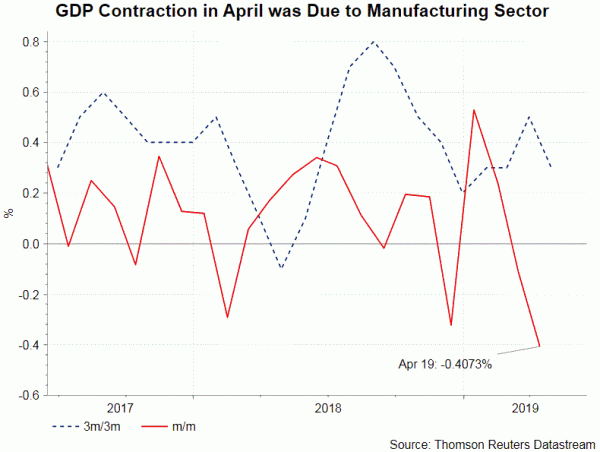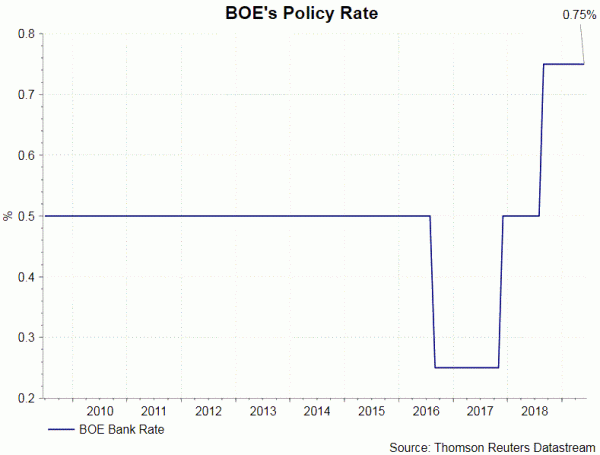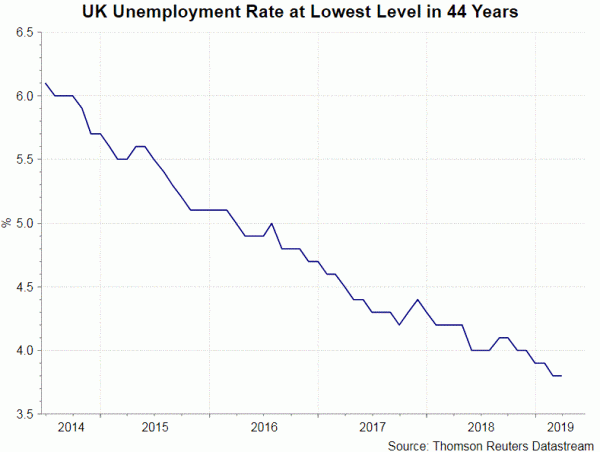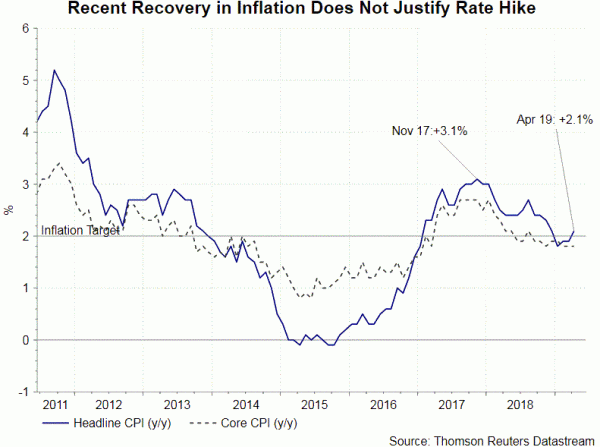We expect BOE to leave the policy rate unchanged at 0.75% this week. It would also keep the size of the asset purchase program at 435B pound. Although there has been some noise pushing for a rate hike, we expect the votes on both measures to be unanimous.
UK’s economy has shown further weakness over the past months. Although inflation has been lifted by sterling depreciation, it has not reached a level that would require tightening actions. Meanwhile, UK’s economic outlook would still be subject to Brexit uncertainty and US-China trade war. We expect BOE to reiterate the stance that the policy rate would increase “at a gradual pace, and to a limited extent” over the next couple of years.
Economic Data Have Been Mixed, If Not Disappointing
UK’s economy contracted -0.4% m/m in April, deteriorating from March’s -0.1%. The weaker- than- expected figure (consensus: -0.1%) was mainly driven by car factory shutdown ahead of the original Brexit deadline. Yet, the auto sector was only part of the reasons leading manufacturing activities to dive -3.9%, sharpest since 2002. From a year ago, GDP growth eased to +1.3%, from March’s +1.9%. As suggested in ONS’ statement, “GDP growth showed some weakening across the latest 3 months, with the economy shrinking in the month of April mainly due to a dramatic fall in car production, with uncertainty ahead of the UK’s original EU departure date leading to planned shutdowns”. It added that “there was also widespread weakness across manufacturing in April, as the boost from the early completion of orders ahead of the UK’s original EU departure date has faded”.

The manufacturing sector is expected to deteriorate further. The IHS Markit/ CIPS manufacturing PMI fell to 49.4, lowest in 34 months in May, with both new orders and employment indices down. Not only does the reading mark a sharp decline from April’s 53.1, it also signals the the manufacturing sector is in contraction. As noted in the accompanying report, “a slowdown in the global economy, and trade wars hotting up could tip the scales even further next month and increase the likelihood that the UK manufacturing sector will remain in contraction territory”.
On the job market, employment gained +32K to 32.75M in the three months to April. While this came in higher than consensus of +10K, it was just about one-third of the addition in March. Moreover, this marks the smallest increase since August and is significantly weaker than the average +167K in 1Q19. That said, the unemployment stayed at a 44-year low of 3.8%. On the positive note, average wage (ex bonus) grew +3.4% y/y in the three months through to April. This came in higher than consensus of +3.1% and the +3.3% growth in March.
Inflation was the key reasons for the previous two BOE rate hikes. While depreciation in British pound has boosted inflation, we believe the current price level is not strong enough to trigger another rate hike yet. Headline CPI improved to +2.1% y/y in April, beating consensus of +2.2% and +1.9% in March. Core CPI steadied at +1.8% y/y, compared with consensus of +1.9%. the inflation report for May is scheduled to release this week.
Mixed Messages from BOE Members
Michael Sauders, probably the most hawkish member, suggested last week that BOE might need to raise interest rate earlier than market expectations. He “stressed” that the central bank “does not necessarily have to keep rates on hold until all Brexit uncertainties are resolved”. This was despite the forecast of “pretty soft numbers in April”. His comment echoed that of Andy Haldane, BOE’s chief economist and another hawkish member. In an opinion piece in the Sun newspaper, he suggested that the time was nearing “when a small rise in rates would be prudent to nip any inflationary risks in the bud”. Earlier this month, BOE Governor Mark Carney suggested that interest rate would need to be increased if the economy performs as expected. This came in line with BOE stance over the previous meetings. While some of the members appear hawkish and has been pushing for a rate hike earlier than market expectations, others remain concerned about downside risks to global and domestic economic outlook. For instance, Gertjan Vlieghe last week noted that recent “data has been a little disappointing and in terms of both the global downside risks and the domestic downside risks my read is that they have both intensified”. He added that “trade relations are making a lot of companies nervous”, noting that trade tensions, as well as Brexit uncertainty have derailed economic improvement.
Brexit Uncertainty
Brexit uncertainty has been prolonged, not eliminated. Surveys show that Brexit hardliner Boris Johnson has the highest chance to be the next PM. The stance of Johnson, as well as the victory of the Brexit camp in the EU parliamentary election, has increased the odds of no-deal Brexit. Yet, it is still not our base scenario. The majority of the MPs (including the Conservatives) in the parliament rejects a no-deal Brexit. Heightened conflict between the government (with the new PM pushing to leave the EU no matter what) and the MPs could leading to some Conservative MPs to trigger a vote of confidence in the new PM, resulting in an early election. For an early election to take place, the UK might need to apply further extension of Brexit into 2020, from October 31 currently.



